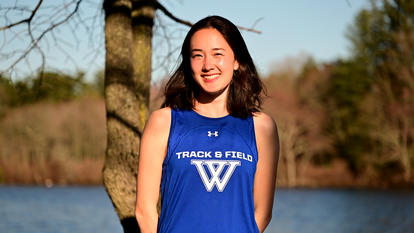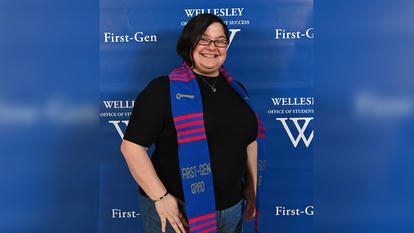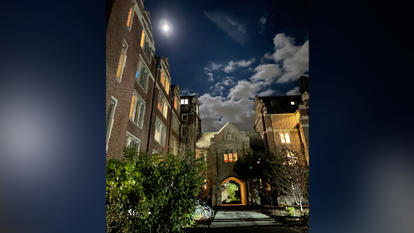The College and World of Wellesley Honor Martin Luther King Jr. at Annual Breakfast

Looking at the civil rights movement today through the lens of the principles that launched the #MeToo movement illuminates the degree to which women have endured gender inequality, even in the broader fights for civil and human rights decades ago, said Layli Maparyan, the Katherine Stone Kaufmann ’67 Executive Director of the Wellesley Centers for Women and professor of Africana studies at Wellesley.
In her keynote remarks during yesterday’s annual Martin Luther King Jr. Breakfast, hosted by the College and local community group World of Wellesley in Alumnae Hall, Maparyan credited King as one of the most prominent leaders of the civil rights movement—while also focusing on that movement’s unfulfilled promises by looking at the current #MeToo movement.
“No longer, in the era of #MeToo, is it all right for the famous, the leaders, those we name as accomplished, to rest on their laurels without a closer examination of how they have treated women behind closed doors,” she said.
In reference to King, Maparyan pointed to reports of his extramarital affairs, which she said “reflect entrenched gender inequality and create an assault on women’s dignity in a particular way that deserves more than glossing over.” The reports, she said, resulted from surveillance launched by then-director of the FBI J. Edgar Hoover, who wanted to harm King’s reputation and “undermine the civil rights movement and, thereby, advancement toward social and political equality for Black Americans.”
Maparyan also spoke about how gender politics affected women leaders in the movement. Ella Baker, for example, worked as a strategist and organizer, but she found herself marginalized. Rather than be sidelined within the Southern Christian Leadership Conference, she left the organization and helped found the Student Nonviolent Coordinating Committee.
“Today, we know that there would be no civil rights movement without women such as these, and frankly, many more,” said Maparyan, “and we can look with 20/20 hindsight and acknowledge that the gender politics of the civil rights movement were less than ideal.” In remarks after her talk, Layli said “examining the Civil Rights movement through a gender lens allows us to make all movements for social justice stronger, more inclusive, and more sustainable.”
The event marked the 18th breakfast sponsored by World of Wellesley (WOW). The College began partnering with the organization four years ago, said Robbin Chapman, associate provost and academic director of diversity and inclusion. She and WOW President Michelle Chalmers said the breakfast is one of several ways in which the town and College are working together to build a productive relationship that benefits Wellesley, its students, faculty, and staff, and the community around it.
The event also featured performances by the Kuumba Singers of Harvard University and the Thunder Step Squad from Wellesley High School.
Layli’s talk embodies the spirit being expressed on college campuses across the country today via the Association of American Colleges and Universities second annual National Day of Racial Healing, a call to engage in activities, events, or strategies that promote healing around issues of racism, bias, inequity and injustice in American society. The NDORH is a part of the W.K. Kellogg Foundation’s Truth, Racial Healing & Transformation (TRHT) effort, a national community-based process to address the historical and contemporary effects of racism.
Image Caption: Dr. Martin Luther King Jr. gives a speech at the Illinois Rally for Civil Rights at Soldier Field on June 21, 1964, in Chicago, the same day of the murders of civil rights workers James Chaney, Andrew Goodman, and Michael Schwerner in Philadelphia, Miss.



